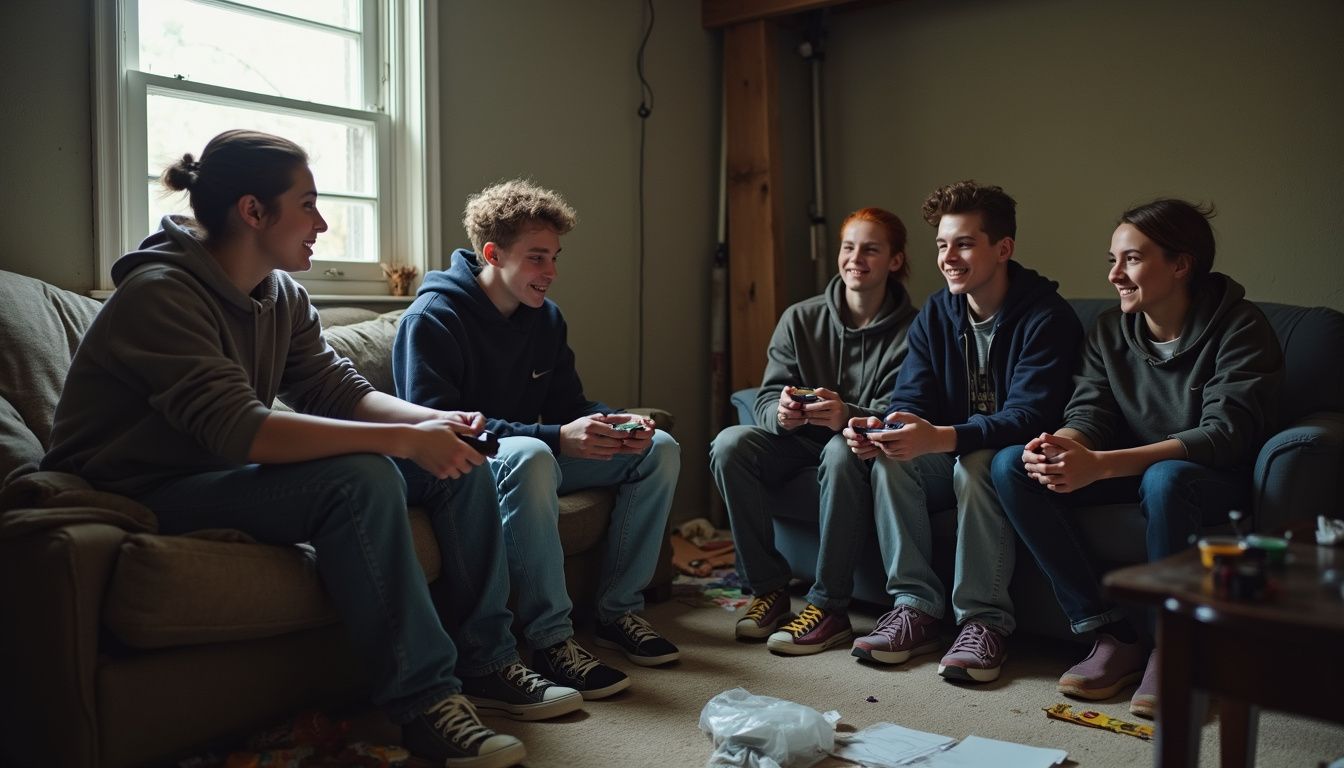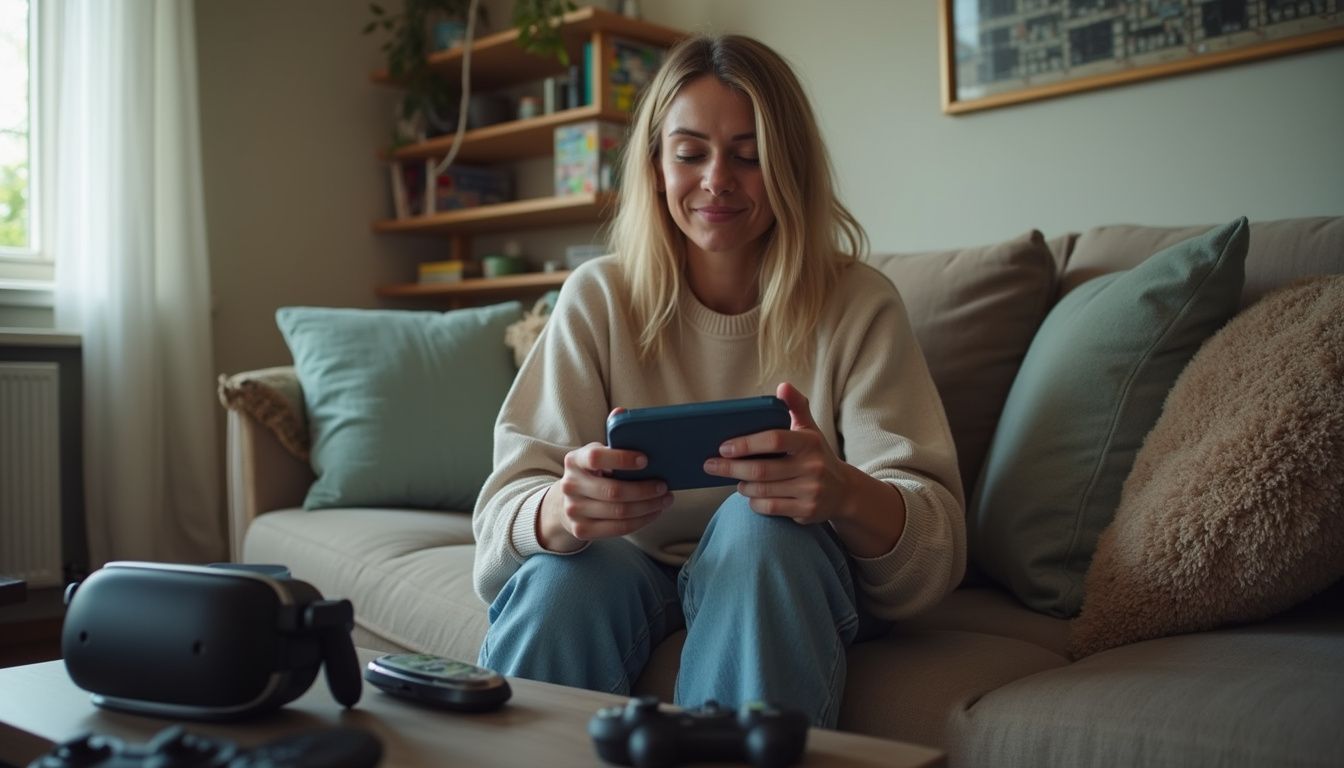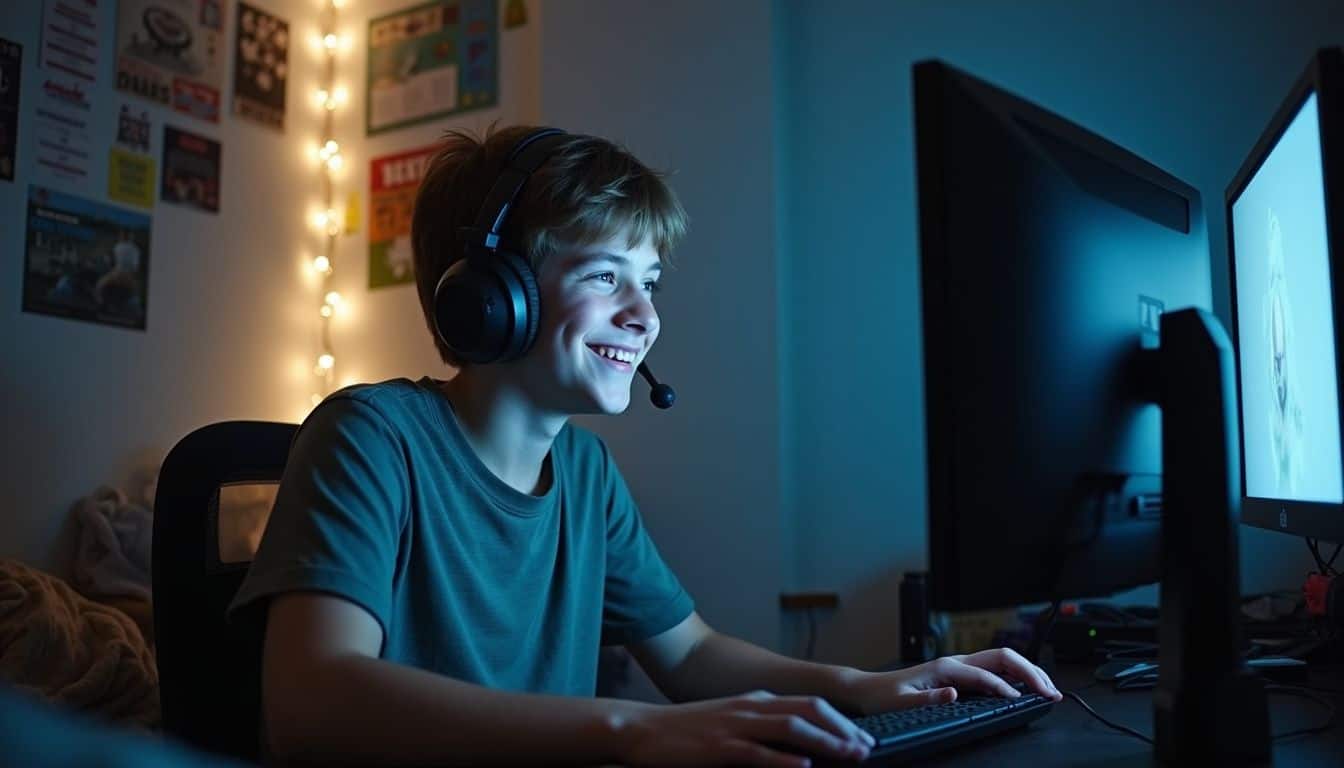Ever feel a little disconnected, like you’re missing that solid friend group? It’s a common feeling, but what if I told you one of the best places to find your people is actually in a video game?
It sounds counterintuitive, I know. We’ve all heard the stereotypes. But the research is clear: the social benefits of online gaming communities are real, and they’re a powerful way to boost well-being and lower stress.
In this blog, I’m going to walk you through how these digital worlds help us build strong friendships, sharpen our social skills, and even improve our mental health. Let’s explore how logging on can help you connect.
Key Takeaways
A 2024 Pew Research study found that nearly half of U.S. teens (47%) have made new friends through online gaming spaces.
Multiplayer games like League of Legends and Overwatch aren’t just for fun; they require intense collaboration, helping players improve teamwork and communication skills with people from diverse backgrounds.
Research from Edge Hill University and the University of York showed that active MMO (massively multiplayer online) gamers often feel less loneliness because of the strong social identity and community support they find.
Online gaming communities can be safe spaces for people dealing with social anxiety or those from marginalized identities, using features like text chat, avatars, and clear anti-harassment rules on platforms like Discord and PlayStation Network.
According to a 2025 report from the Entertainment Software Association (ESA), 77% of players feel less stressed after gaming, and platforms like Twitch create global connections through shared experiences.
Table of Contents
Building Connections Through Online Gaming Communities

In virtual communities, from the chill vibes of Stardew Valley to the sprawling worlds of sandbox games, you meet people from all walks of life. These online friends can quickly become your go-to team for everything, from tackling tough in-game challenges to just chatting late at night.
How do online games help create friendships across distances?
Online video games easily connect people from different cities, countries, and even continents. According to a 2024 Pew Research study, 47% of teens in the U.S. say these digital spaces are where they form new friendships and keep up with old ones.
Multiplayer environments, especially massively multiplayer games, act like digital hangouts. You can chat through a headset, send messages, or team up for quests, making it feel like everyone is in the same room, even if you’re miles apart. Nothing builds a bond faster than a shared struggle, like taking on a tough boss in a game like Elden Ring or coordinating a chaotic mission in Helldivers 2.
These shared wins and losses strengthen bonds because you’re spending real time cooperating on meaningful goals. For instance, I met one of my best friends during an all-night raid in a virtual world; we still connect on Discord every week to catch up on life between matches.
Platforms such as RealPrize, a free social casino, offer another way to connect. They create a space where friendly competition and community meet, offering multiplayer challenges and shared achievements that help turn strangers into teammates.
A tough match can spark a years-long friendship faster than any awkward real-world icebreaker!
Friends made in virtual teams often talk more frequently than some classmates because their interactions happen across daily logins. This constant contact lets players share stories, celebrate wins with emotes, and laugh over voice chat. The distance quickly fades when communication is this easy.
How can shared gaming experiences strengthen existing relationships?
Sharing a victory in massively multiplayer online games can feel just as thrilling as scoring the winning point in a real-life sport. These moments create stories and inside jokes that stick with you long after you’ve logged off.
Achieving a difficult goal together, like beating a raid boss on the hardest difficulty, reinforces trust and friendship. For couples, research from Brigham Young University found that playing video games together can increase marital satisfaction. Games specifically designed for cooperation, like the award-winning It Takes Two, provide a perfect platform for this.
Players cheer each other on, exchange tips, and communicate through emotes and voice chat. Even epic fails can lead to laughter and deepen bonds. Some groups even use their gaming skills for good by organizing charity events, which research shows can spark an even stronger sense of belonging.
If you’re looking for more ways to connect, checking out guides on [making friends as a geek](https://www.geekextreme.com/how-to-make-friends-as-a-geek/) can offer even more ideas to take your team-building to the next level.
In what ways do gaming communities foster belonging and identity?
Once you’ve built those connections, gaming communities become places that nurture a sense of belonging and identity. A study by Edge Hill University and the University of York involving over 700 MMO players found a direct link between having a strong social identity in a game and feeling less lonely.
Dr. Linda Kaye’s research confirmed that friendships sparked by common gaming interests are just as meaningful as in-person ones. In massive games like Final Fantasy XIV, players form “Free Companies,” which are basically large social clubs that act as built-in support systems. Players build social capital by teaming up for quests, crafting gear for each other, or just hanging out in a virtual home.
For many, these virtual environments provide a safe space to explore their personality. You can learn more about understanding gaming culture to see how these communities create spaces for self-expression without the social pressures of the real world.
How Can Online Games Improve Social Skills?

While tackling quests with others, gamers naturally develop strong communication skills. These digital hangouts can turn even the shyest player into a confident teammate, translating virtual wins into real-world social confidence.
How do online games develop teamwork and collaboration?
Team-based games like League of Legends or Overwatch demand sharp communication. A team’s victory often hinges on players coordinating moves, sharing information, and adapting strategies on the fly.
A heated match can transform a quiet player into the team’s “shot-caller,” barking out directions and cheering after a smart play. I’ve seen shy friends step up to lead raids, learning to read tone of voice and even silence as important cues. A 2024 study in *Human Resource Development International* even reported that massive multiplayer online gamers learn valuable workplace skills like leadership and problem-solving through play.
This teamwork builds trust. If the healer in Apex Legends is out of position, everyone feels it. These collaborative experiences mirror real-world projects, boosting communication skills and strengthening bonds far beyond the game.
How can online gaming improve verbal and non-verbal communication?
Great teamwork in online games is built on strong communication skills. Platforms like Discord and Steam are central to gaming, relying on clear verbal signals and quick text-based reactions.
Voice and text chats push players to be precise. A well-timed “behind you!” can save a teammate and change the outcome of a match. But it’s not all verbal. The celebrated “ping” system in Apex Legends allows players to communicate complex strategies without saying a word, a fantastic example of nonverbal communications.
Gestures from avatars, emotes during tense moments, and quick pings all train your brain to pick up on nonverbal cues in real time. A 2021 study using multivariate analysis of variance confirmed that repeated play boosts confidence in speaking up, which is huge for socially anxious teens or anyone dealing with what researchers like Leung L. described as shyness.
How do games encourage empathy and understanding of others?
Multiplayer games often require you to step into someone else’s shoes. Imagine a raid in Final Fantasy XIV where every team member has a critical role. This naturally fosters empathy as you feel your healer’s stress or your tank’s frustration.
Playing with a global community also brings cross-cultural understanding to life. Newzoo’s 2025 Global Games Market Report estimates there will be 3.6 billion players worldwide this year, creating a massive melting pot of cultures. I once played League of Legends with someone from Brazil who explained strategies based on their local tournaments, opening my mind to a new perspective faster than any textbook could.
Even single-player, story-driven games like Life is Strange are powerful tools for building empathy. By making choices that have real emotional consequences for the characters, you learn to see the world from different viewpoints.
Providing a Safe Space for Interaction

Online gaming allows people to meet new friends and explore social environments without the fear that can come with face-to-face interaction. These digital hangouts are boosting real connections for millions.
How do online games offer a low-pressure environment for social anxiety?
For many, text chat and avatars are a game-changer. It can feel much less intimidating to type a quick “GG” (good game) than to make small talk in person. For those with social anxiety, this setup makes interaction feel more casual and less daunting.
Games with calm, non-toxic communities, like Animal Crossing: New Horizons, create spaces where mistakes don’t feel like a big deal. You can take your time before replying. My friend Chris, who struggles with shyness, puts it perfectly:
“In-game chats are like training wheels for real conversations.”
Voice chat offers practice for speaking up, but it still feels safer without anyone staring back at you. These communities give you room to test out social skills without risking harsh judgment, building confidence at your own pace.
How do gaming communities support marginalized groups and promote inclusion?
Online gaming communities can be a lifeline for marginalized groups by providing a safe place to connect. As someone who often feels out of place at parties, I found more support in my guild’s Discord server than almost anywhere offline.
Dedicated organizations are also making a huge difference. Groups like these are working to make gaming more inclusive:
- AbleGamers: This charity focuses on improving accessibility in gaming, helping combat social isolation for people with disabilities.
- GaymerX: This nonprofit is dedicated to celebrating and supporting LGBTQ+ people in the gaming world, creating safe and welcoming convention spaces.
Platforms like Steam and PlayStation Network now have clearer rules and reporting tools to combat toxic behavior and online harassment. Many communities have also adopted simple but powerful tools for inclusion, like offering pronoun roles on their Discord servers.
How can avatars and virtual spaces allow identity exploration?
In games like Minecraft and Roblox, players can customize their avatars to try on new identities, much like trying on a new outfit. I’ve found that swapping from a space rogue to a quiet mage can offer surprising insights into myself.
This customization lets you reflect your interests, beliefs, and even your mood. Virtual spaces like VRChat are built entirely around this idea, acting as a low-pressure lab for self-expression. Research on VRChat has shown how users can challenge traditional gender norms and explore different aspects of their identity in a supportive environment.
For many, just spending time in a character creator, like the incredibly detailed one in Baldur’s Gate 3, is a meaningful form of self-expression before the game even begins.
What Are the Emotional Benefits of Online Gaming Communities?

Online gaming communities provide support that helps people handle loneliness. Playing together can boost confidence and make stress melt away.
How do online gaming communities reduce loneliness and offer support?
Gamers find real friends through shared experiences. Pew Research Center found that 72% of teen gamers play to spend time with others, not just to compete. My own guild on Discord helped me through a tough time; their support felt genuine and constant.
Even watching others play can build community. Streaming giants like Twitch create massive spaces where viewers chat and laugh together. Many streamers also organize charity events, like the annual St. Jude PLAY LIVE, which raises millions and fosters a huge sense of shared purpose.
These digital spaces allow anyone to jump into a conversation and find someone who gets them. They build real health benefits, boost confidence, and help us feel seen.
How can positive interactions in gaming build confidence?
Getting positive feedback from teammates in games like World of Warcraft or Fortnite can be a huge lift to your self-image. Each successful round or well-timed assist boosts your sense of accomplishment.
Many games have built-in mentoring systems. In Destiny 2, for example, experienced players known as “Sherpas” guide newcomers through difficult raids. This act of teaching and helping builds confidence for both the mentor and the new player.
Social scientists like Leung L. found that online gaming builds confidence for those who struggle with shyness in face-to-face situations. Each win and positive interaction turns into lasting confidence that extends beyond the game.
How do online games promote stress relief and relaxation?
Confidence often leads to feeling more relaxed. According to the ESA’s 2025 Global Power of Play report, 77% of players feel less stressed, and 70% feel less anxious while gaming.
Engaging gameplay can pull your mind away from daily worries. This is especially true for “cozy games,” a genre designed specifically for relaxation. Titles like Stardew Valley and Animal Crossing offer simple, rewarding tasks with no real way to lose. Research has even suggested that playing these casual games can be as effective at reducing stress as mindful meditation.
Overcoming a tricky puzzle or achieving a small goal gives you a little win that can spark real-life confidence. Sometimes, a good distraction and an in-game victory are all you need to feel better.
How Do Online Gaming Communities Bridge Cultural and Social Gaps?
Gamers from every continent meet up in League of Legends matches and Fortnite squads. Discord servers often feel like global cafes, mixing languages and sparking friendships that blur national borders.
How do these communities facilitate connections across diverse backgrounds?
A player from Tokyo can trade strategies with a teammate in Berlin using simple chat tools like Discord. Multiplayer games like Minecraft gather people from all walks of life, creating a melting pot of ideas and inside jokes.
Shared missions demand teamwork, forming alliances between strangers who might never meet otherwise. A 2025 report from Newzoo estimates the global number of gamers will reach 3.6 billion, highlighting the massive scale of this cross-cultural interaction. Avatars help everyone express their own style or try on new identities without fear, allowing cultural backgrounds to blend seamlessly.
In what ways do online games encourage cultural exchange and understanding?
Multiplayer games spark global conversations. You might team up with someone from Brazil, trade items with a player from South Korea, or battle alongside a friend in Germany. This social interaction naturally boosts your openness to different cultures.
Through guilds and chat channels, people swap stories about their customs, food, and holidays without even thinking about it. Some games are even rich in a specific culture, like Ghost of Tsushima, which is set in historical Japan. These games often spark a player’s interest in those real-world cultures, leading them to learn more on their own.
What Is the Role of Leadership in Online Gaming?
Good leaders in gaming keep their teams focused and help everyone improve their decision-making. Running a guild or a clan can teach you real-world lessons in teamwork and management.
How can online games develop leadership and decision-making skills?
Games like World of Warcraft, Overwatch, and League of Legends put you in situations where quick, decisive action matters. You lead raids, manage conflicts, and make tough calls under pressure.
I once led a guild in World of Warcraft, and juggling different personalities and strategies leveled up my problem-solving skills faster than my character. Research from the University of Houston in 2024 confirmed that these skills are transferable to the workplace, improving everything from patience to coaching abilities. Veteran players often step up to mentor newbies, practicing leadership and building interpersonal relationships along the way.
How does team management enhance social networking in gaming?
A good team manager in a game like Overwatch guides the group, sets clear goals, and keeps everyone on the same page. To help with this, many guilds use dedicated management tools like Guilded, which offers shared calendars, forums, and recruitment features.
These leaders foster open dialogue, making it easier for shy members to join conversations. Trust builds with each successful match, turning a group of individuals into a real team. As everyone learns to adapt to new challenges, friendships grow deeper and often extend beyond the game itself.
How Will Online Gaming Communities Evolve in 2025?
Looking ahead, gaming communities will become even more connected. We’ll see more advanced digital social tools that make finding and connecting with others easier than ever.
The stereotype of a gamer playing alone is already fading fast. It’s being replaced by the reality of vibrant, global communities where anyone can find a place to belong.
Technologies like cross-platform play, which allows people on PlayStation, Xbox, and PC to all play together, are breaking down the final barriers between players.
Esports leagues will keep growing, and streaming sites like Twitch and YouTube Gaming will attract even more viewers. The core of it all remains the same, though. Interactive spaces in games let players share tactics and swap stories, creating collaborative zones where everyone can improve together.
People Also Ask
How do online gaming communities help with problem-solving skills?
Fast-paced strategy games, like many MOBAs or mission-based titles, require you to analyze situations and adapt quickly with your team, building real-world problem-solving skills. A 2024 Pew Research study even found that 56 percent of teens believe video games have sharpened their ability to solve complex problems.
What does synergy mean in online gaming communities?
It describes how players combine unique roles for a greater effect, like when a “tank” character in World of Warcraft absorbs damage so a “healer” can support the team. This teamwork allows the group to accomplish goals that would be impossible for any single player to achieve alone.
Can joining online gaming communities improve social skills?
Absolutely, using platforms like Discord to coordinate with players from around the world helps build communication, teamwork, and even leadership skills. A study from the University of Glasgow showed that 69% of gamers reported improved communication skills after their gaming sessions.
Do online games help people feel less alone?
Yes, joining a guild or squad provides a built-in social circle and a strong sense of community that actively reduces feelings of loneliness.
References
https://www.jcfs.org/response/blog/video-games-are-social-spaces-how-video-games-help-people-connect
https://www.sciencedirect.com/science/article/pii/S0747563223002029
https://www.nature.com/articles/s41599-025-04690-6
https://pmc.ncbi.nlm.nih.gov/articles/PMC4080869/
https://pmc.ncbi.nlm.nih.gov/articles/PMC9047596/
https://dl.acm.org/doi/10.1145/3706598.3713262
https://gametree.me/blog/the-social-benefits-of-online-gaming-communities/ (2025-09-10)
https://digitalcommons.pepperdine.edu/cgi/viewcontent.cgi?article=1038&context=swbj
